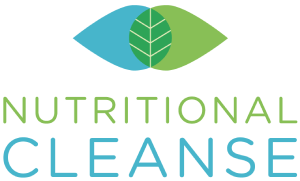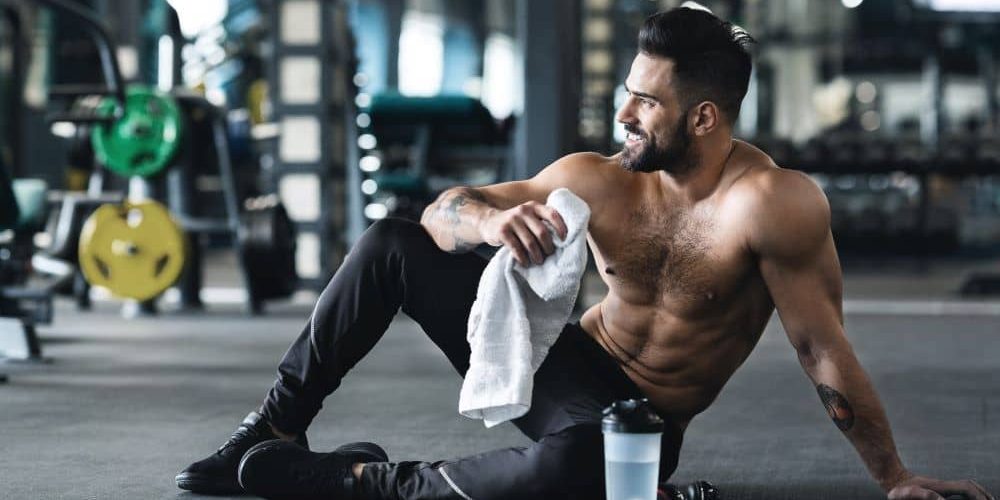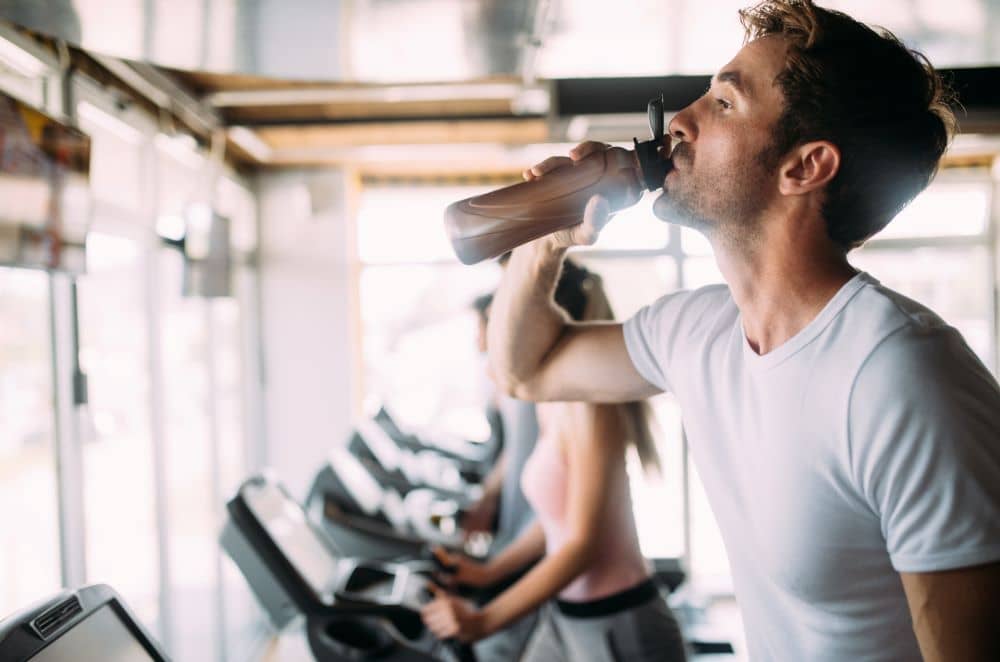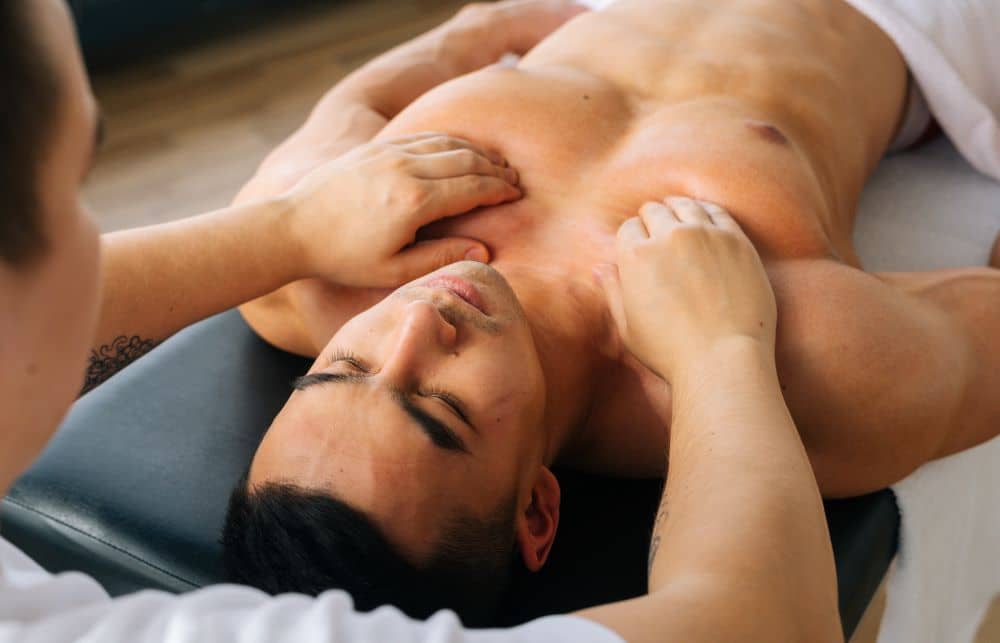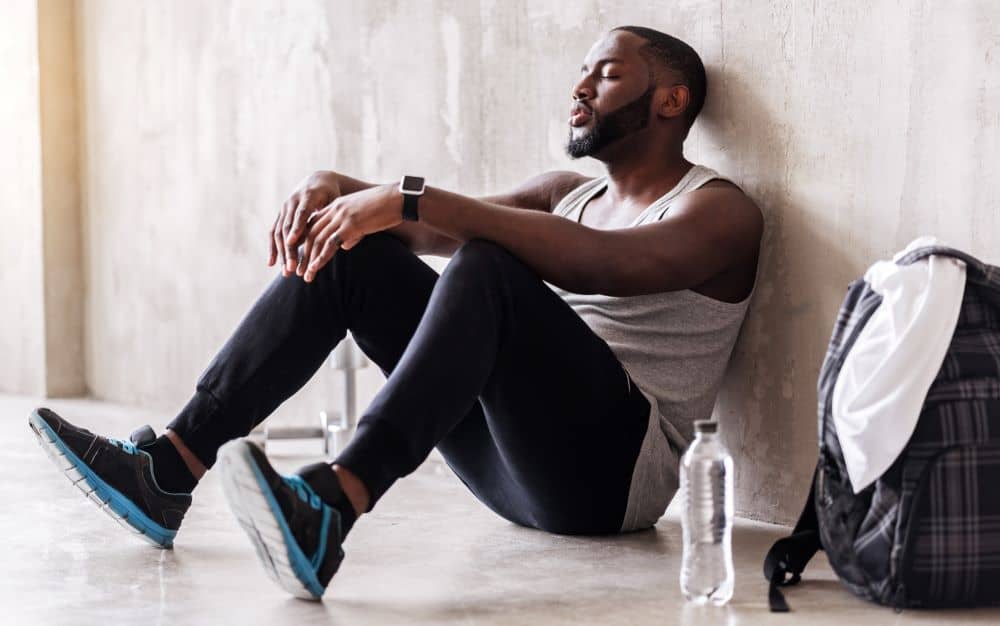The 7 Best Post-Workout Tips for Men to Maximize Results
Did you know what you do after your workout is just as important as your workout itself?
Since we already covered some of the best pre-workout tips and the ideal post-workout snacks and meals, we put together a guide to the best post-workout tips for men.
Try following these post-workout tips if you want to recover faster, maximize your workouts, optimize muscle building, and take your workout routine to the next level.
Best Post-Workout Tips for Men
1. Take Time To Do A Proper Cool Down and Stretch
During a workout, your heart rate increases, blood vessels dilate to bring blood to muscles, and your body temperature goes up. A proper cool down after your workout is crucial for keeping you limber, encouraging muscle recovery, and enhancing the process of lean muscle growth.
A mix of dynamic and passive stretching can help give muscles the time they need to cool down and restore your heart rate to its resting state. You can also try active recoveries such as a bike ride, brisk walk, or other easy, gentle movements. This can help improve circulation and promote the transport of nutrients and waste throughout the body.
Stretching immediately after a workout is especially effective as your muscles are pliable and warm, making it easier to maximize your flexibility. Maintaining limber joints and muscles also helps you maximize performance during your next workout.
Cooling down and stretching post-workout also plays a key role in reducing delayed onset muscle soreness (DOMS), the pain, stiffness, and swelling that can occur after exercise. While you can’t completely prevent delayed onset muscle soreness, a proper stretch session may help reduce soreness and provide muscles with nutrients by enhancing body heat and blood flow.
2. Drink Enough Water
We all know how important it is to drink enough water every day, but it is particularly important to drink enough water before, during, and after workouts.
During intense workouts, the body can lose over a quart of water. When the body loses electrolytes through sweat, the resulting imbalance can lead to a variety of unwanted symptoms such as:
- Confusion
- Muscle cramps
- Nausea
- Fatigue
Drinking enough water helps restore the body’s electrolyte balance and prevent these symptoms.
A good rule is to aim to keep a water bottle handy and replace every pound lost during working out with 2 cups of water. Trying to do a quick weigh-in before and after workouts can give you an excellent idea of how much water you should be drinking.
Water also helps prevent muscle proteins from breaking down and enhances nutrient absorption from food. It also helps cushion and lubricates tissues and joints, helping them remain elastic, increasing flexibility, and reducing muscle and joint pain.
3. Find the Best Post-Workout Meals and Snacks
When you complete an intense workout, your body will use the nutrients from proteins and carbohydrates to replenish and repair damaged muscle cells and support your nervous system. Eating a healthy meal or snack within 30 to 60 minutes after a workout can help promote recovery.
Here is a quick look at some of the most important nutrients to focus on after a workout.
Carbohydrates – During workouts, glycogen is used as the primary fuel source. Following a workout, a serving of complex carbs can help replenish your body’s glycogen stores. Your body turns carbohydrates into glycogen, so consider complex carbs such as sweet potato, sprouted bread, or a banana. A good rule of thumb is to consume a similar ratio of carbs to protein after a workout.
Sodium – Similar to potassium, sodium is an electrolyte that plays a role in water regulation in and around cells. The right amount of sodium is needed to maintain normal blood pressure, support proper muscle function, and transmit nerve impulses. Improper levels of sodium can lead to a disruption in hydration and prolonged soreness.
Potassium – As with sodium, potassium helps maintain hydration levels. It also plays a role in ensuring the growth of lean muscle tissue. High potassium foods include salmon, bananas, whole milk, and baked potato with skin. Low potassium may put you at risk of muscle cramps and fatigue after a workout.
Protein – Protein consists of amino acids, the building blocks of cells. It is crucial to supply your body with adequate protein to help repair itself after a workout and encourage the growth of lean muscle tissue.
A few examples of the best post-workout snacks include:
- A high-quality protein shake
- Greek yogurt with berries
- Grilled chicken with rice and a side of broccoli
- A banana with almond butter
For a more in-depth look at what to eat after a workout, check out our blog on the best post-workout meals and snacks.
4. Get a Massage
Looking for a great post-workout reward? A massage is relaxing, feels great, and can help improve circulation and promote muscle recovery.
You can also perform self-massage by completing foam roller exercises following a tough workout.
5. Get Enough Sleep
Did you know some professional athletes aim to sleep 10 or more hours a night? Individuals who complete regular intense workouts require more rest than the average individual.
Sleep plays a key role in almost every aspect of health, including muscle recovery and growth. During sleep, the body produces Growth Hormone, a hormone responsible for the repair and growth of tissues. Lack of sleep has been found to promote inflammation and reduce the production of hormones that aid in muscle growth, thereby impairing the body’s recovery and muscle building process.
6. Take an Ice Bath
Many top athletes and fitness fanatics swear by the benefits of ice baths or contrasting water therapy (alternating between cold and hot showers) to promote faster recovery, prevent injury, and reduce sore muscles.
The theory behind these methods is that dilating and constricting blood vessels help move out waste in tissues and reduce inflammation.
How to do contrast water therapy:
- Take a 2-minute hot shower
- Switch to cold water for 30 seconds
- Repeat the process four times in total
- In between each hot and cold shower, use moderate temperature water for one minute
If you are in a facility with a hot tub and pool, you can plunge back and forth between the two.
7. Allow Enough Time for Recovery
If you do not allow your body and muscles enough time to recover between workouts, you put yourself at risk of injury or stalled results.
During exercise, small tears called microtears can lead to muscle soreness and inflammation. Too many of these tears can put you at risk of pulled muscles or muscle strains.
Although the optimal recovery time varies from individual to individual and depends on the intensity and duration of the physical activity, muscles generally need at least 24 hours for recovery. After especially challenging or long workouts, recovery may take two to three days.
What is the ideal recovery time after a workout? Ultimately, it will come down to listening to your body. Getting proper sleep and nutrition, as well as managing stress levels, can all help keep your recovery time as short as possible.
Final Thoughts
If your muscles are constantly sore or your results in the gym have stalled, consider adjusting your post-workout routine accordingly and seeing if you experience any positive changes.
Do you have a post-workout routine? What are your favourite ways to recover after a tough session at the gym? Be sure to let us know in the comments – we always love hearing your feedback!
For more tips on optimizing your workouts, healthy diet ideas, wellness, check out our blog or contact our team and we would be happy to help answer your health and fitness questions, recommend supplements to complement your training routine, and encourage you on your journey to wellness.

